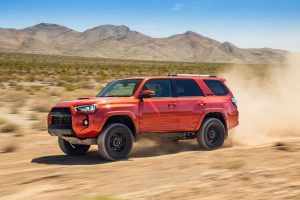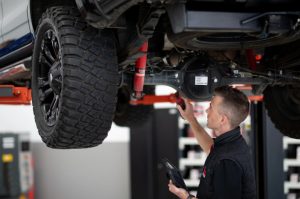Your vehicle’s suspension system is your first line of defense against rough roads, potholes, and heavy loads. But not all driving is created equal — different terrains and conditions accelerate wear on suspension components. Understanding these influences helps maintain ride comfort, safety, and component longevity.

Impact of Terrain on Suspension Wear
| Terrain Type | Wear Impact | Affected Components |
|---|---|---|
| City Streets | Frequent potholes and curbs | Shocks, struts, bushings, control arms |
| Gravel/Rural Roads | Constant vibration and stone impact | Springs, shocks, sway bars, mounts |
| Off-Road Trails | Deep ruts and rock hits | Control arms, ball joints, CV joints, bushings |
| Highways | High-speed loading, minimal displacement | Shock seals, mount fatigue |
| Snow/Icy Roads | Corrosion-inducing salt + freeze-thaw cycles | Springs, bushings, stabilizer links |
| Towing Loads | Extra sag and pitch under load | Springs, shocks, rear suspension |
-
City driving with potholes fatigues mounts and seals, causing leaks and reduced damping.
-
Gravel/off-road use leads to constant vibration and impacts that bend and damage linkages.
-
Highway speeds stress shocks thermally over time — even without noticeable road damage.
-
Winter salt and moisture accelerate corrosion, harming springs, bushings, and links.
-
Towing or heavy loads compress springs and shocks past normal limits, reducing ride control.
Component-Specific Wear Factors
A. Shock Absorbers & Struts
-
Oil seal failure due to debris and aggressive movement.
-
Heat buildup on highways weakening damping ability.
-
Rust on shafts and mounts from salty roads.
B. Springs (Coil, Leaf, Air Assist)
-
Sagging from constant heavy use.
-
Cracked coils or leaf breaks under stress.
-
Air spring leaks reducing load support.
C. Bushings & Mounts
-
Rubber cracks and hardens from UV, cold, chemicals.
-
Loose joints producing noise and alignment issues.
-
Corroded brackets weakening mount structure.
D. Linkages & Ball Joints
-
Joints wear from vibrations and road impacts.
-
Exposed joints let dirt in, causing grease loss and metal wear.
E. Sway Bar Components
-
End-link joints wear quickly with lateral forces.
-
Bushings crush, resulting in squeaks and rattles.
Prevention & Maintenance Checklist
a) Regular Inspection (every 10 000 km or 6 months):
-
Visual check for leaks, rust, fatigue cracks.
-
Perform bounce test at each wheel to evaluate shock condition.
b) Torque & Tighten:
-
Ensure all bolts in arms, control links, and end-links are torqued to spec.
c) Clean & Lubricate:
-
Rinse off salt and debris.
-
Lubricate bushings and joints with recommended grease.
d) Upgrade or Replace:
-
Use heavy-duty shocks/springs for frequent gravel or towing.
-
Consider corrosion-resistant or polyurethane bushings for harsh climates.
e) Alignment Checks:
-
Always realign after replacing suspension components.
Component Lifespan by Condition
| Condition | Shocks | Springs | Bushings | Ball Joints |
|---|---|---|---|---|
| Smooth high‑ways | 80 000–120 000 km | 150 000 km+ | 120 000 km+ | 150 000 km+ |
| City + potholes | 40 000–60 000 km | 80 000–120 000 km | 60 000 km | 80 000 km |
| Gravel/off‑road | 30 000–50 000 km | 60 000–100 000 km | 40 000 km | 50 000 km |
| Heavy towing/load | 20 000–40 000 km | 50 000–80 000 km | 30 000 km | 50 000 km |
Driving Condition Best Practices
-
Adjust tire pressure: slightly lower for gravel/off-road to improve absorption.
-
Drive cautiously: slow down over potholes, speed bumps, and road distortions.
-
Distribute loads evenly — especially when towing.
-
Inspect more often if you drive off-road, tow, or face heavy salt use.
When to Upgrade or Replace

-
Sagging ride or excessive bounce: replace springs/shocks.
-
Leaking shocks or oil stains: immediate replacement needed.
-
Suspension noises: check bushings, end-links, and mounts.
-
Uneven tire wear after alignment: inspect suspension geometry and components.
Buy Quality Suspension Parts
When components wear or when upgrading for demanding conditions:
Buy Suspension online: shocks, springs, bushings, rear suspension kits with fast delivery and perfect fit.
Final Thoughts
Suspension wear is influenced not just by miles but also by where and how you drive. City potholes, gravel impacts, winter corrosion, and heavy towing each accelerate fatigue differently. Regular inspections, climate-sensible upgrades, and targeted maintenance ensure your vehicle remains safe, comfortable, and mechanically sound. Appropriate parts and care preserve handling, reduce costs, and protect against accidents.
Drive well-managed — and ride confidently, no matter the terrain.